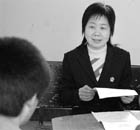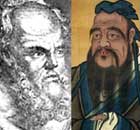Society
Burying the dead comes with risks
(China Daily)
Updated: 2010-04-06 08:03
 |
Large Medium Small |
BEIJING - During China's traditional holiday for honoring the dead, which fell on Monday, throngs of people jostled along the 2-km road in Liudaokou village, Tianjin municipality, where more than 100 wholesale funeral supply shops competed for business.
 A man visits a cemetary in Hangzhou, capital of Zhejiang province, to commemorate a deceased relative on Sunday. [China Daily] |
"It's easy money," Li said. "Take urns for example, no one wants to bargain for a container of his father, mother or whoever's ashes."
In a country where about 10 million people die every year, the funeral industry market is worth tens of billions of yuan, said Hao Maishou, a researcher with Tianjin Academy of Social Sciences.
However, a lack of market management is allowing unscrupulous business people to monopolize areas of the industry and exploit people's grief, Hao said.
In another shop, tags claim that the urns, priced from 200 to 600 yuan, are made of rare and precious ebony or redwood, a claim that invites questions.
Elaborate funerals remain a traditional culture of the Chinese, as nobody wants to be regarded as stingy or unfilial, especially for deceased family members, said a Tianjin businessman involved in funeral services, who only identifies himself as Liu.
"As long as you understand and utilize such a feeling, you are guaranteed to make a pile (of money)," Liu said.
At an urban Tianjin funeral home, a government-run facility that provides cremation and funeral services, an "ebony" urn bearing the traditional painting Riverside Scene on Tomb-Sweeping Day sells for 12,800 yuan while the same urn costs only 1,100 yuan in Liudaokou.
Tombs are another major source of profit for the industry. In a suburban graveyard in west Beijing, Liu Hai has just bought an 0.8 square meter tomb for 75,000 yuan.
"The tomb's price per sq m was even higher than that of premium apartments in urban Beijing, but it was for my mother, so I had no choice," Liu said.
City governments, which put a priority on meeting demand for housing land, are prudent in allocating land for graves, creating a supply shortage, said Liu Tieliang, vice-president of the Chinese Folklore Society.
China released its first green paper on the funeral industry on March 31. It says a Beijing family spends 3,000 yuan on average for a service package from a funeral home. The cost does not include the money spent at home, tombs or funeral supply shops outside the public facilities.
The green paper sparked a heated debate among netizens. In a poll by portal Sohu.com, 92 percent of 5,600 respondents agreed the funeral industry earns too much. Figures released on Friday by the Ministry of Civil Affairs show the country spends 399 million yuan to subsidize the funeral services of 924,000 deceased people every year.
About 132 million low-income Chinese are eligible for subsidies or remissions of funeral costs, according to the ministry.
Xinhua











